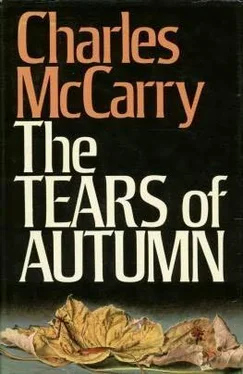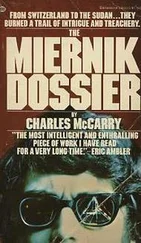
Charles Mccarry
The Tears Of Autumn
The second book in the Paul Christopher series, 1974
“To the living, one owes consideration;
to the dead, only the truth.”
– VOLTAIRE (Lettres Sur Oedipe)
“The Pentagon’s secret study of the Vietnam war discloses that President Kennedy knew and approved of plans for the military coup d’état that overthrew President Ngo Dinh Diem in 1963…
“‘Our complicity in his overthrow heightened our responsibilities and our commitments’ in Vietnam, the study finds…”
– THE PENTAGON PAPERS, as published by
The New York Times
Paul Christopher had been loved by two women who could not understand why he had stopped writing poetry. Cathy, his wife, imagined that some earlier girl had poisoned his gift. She became hysterical in bed, believing that she could draw the secret out of his body and into her own, as venom is sucked from a snakebite. Christopher did not try to tell her the truth; she had no right to know it and could not have understood it. Cathy wanted nothing except a poem about herself. She wanted to watch their lovemaking in a sonnet. Christopher could not write it. She punished him with lovers and went back to America.
Now his new girl had found, in a flea market on the Ponte Sisto, the book of verses he had published fifteen years earlier, before he became a spy. Christopher read her letter in the Bangkok airport; her headlong sentences, covering the crisp airmail sheet, were like a photograph of her face. She made him smile. His flight was called over the loudspeaker in Thai; he waited for the English announcement before he moved toward the door, so that no one who might be watching him should guess that he understood the local language. His girl was waiting in Rome, changed by her discovery that he had once been able to describe what he felt.
Christopher walked across the scorched tarmac into the cool American airplane. He didn’t smile at the stewardess; his teeth were black with the charcoal he had chewed to cure his diarrhea. He had been traveling down the coast of Asia for three weeks, and he had spent the last night of his journey in Bangkok with a man he knew was going to die. The man was a Vietnamese named Luong. He thought Christopher’s name was Crawford.
They had met in the evening, when it was cool enough to remain outside, and walked together along the river while Luong delivered his report. Later, at a restaurant, the two of them ate Thai food, drank champagne, and talked in French about the future. Just before dawn, Christopher gave his agent money to pay for the girl, quiet and smooth as a child, who sat down beside Luong arid placed her small hand in his lap. Luong smiled, closed his eyes, and ran his fingertips over the flowered material of the girl’s dress and onto the skin of her neck. “No difference, silk and silk,” he said. “Can you loan me some baht?” Christopher handed Luong two dirty Thai bank notes. Luong, his face reddened by drink, started to leave with the girl, then came back to Christopher. “Is it true that these girls will dance on your spine before making love?” he asked. Christopher nodded and gave him another hundred- baht note.
Christopher paid the bartender and left. He walked through the city with its smell of waste: dead vegetation, open drains, untreated diseases of the skin. The people who slept in the streets were awakening as the sun, coming up on the flat horizon, flashed into the city like light through the lens of a camera. A leper, opening his eyes and seeing a white man, showed Christopher his sores. Christopher gave him a coin and walked on.
When he reached the river, he hired a boatman to take him to the floating market. He had three hours to kill before going to the airport. It was cooler on the river, and he was just another white man among dozens who had risen early to be paddled past the grinning naked boys standing in the roiled waters and the market boats filled with odorless flowers and lovely fruits that had no taste. He bought some limes and shared them with the boatman.
The night before, in the toilet of a bar, Luong had put his thumbprint on a receipt for the money Christopher brought to him, his monthly stipend. While Luong cleaned the ink off his thumb with whiskey from the glass he had carried with him into the toilet, Christopher showed him the envelope. It was filled with Swiss francs, new blue hundred-franc notes. “I’d better keep this till morning,” Christopher said. Luong, who always ended the night with a girl, nodded. They agreed on a plan for a meeting in the morning, checking their watches to be sure that they showed the same time.
Now, as Luong slept, Christopher took the envelope out of his coat pocket. He put the stamp pad inside with the money, sealed it, and dropped it over the side of the boat. The white envelope twisted in the moving brown water of the Chao Phraya and disappeared.
Christopher smiled at his own gesture. It was not likely that Luong would understand the message. He trusted Christopher. Luong knew, of course, that agents were sometimes sacrificed, but he did not consider himself an agent. He did things for Christopher and Christopher did things for him: though Christopher was white and Luong was brown, they had the same beliefs. “This money,” he asked once, “it’s good money, from people like us?” Christopher replied, “Yes.” Luong was a subtle man, but Christopher, throwing ten thousand francs in secret funds into a tropical river, did not really believe that the Vietnamese would understand that the loss of the money meant the loss of Christopher’s protection. It was more likely that he’d think there had been a mistake, that Christopher would come back, as he had always done. Luong would go back to Saigon and die.
Christopher was in no danger. If the secret police in Saigon interrogated Luong before they killed him, he would speak about a blond American named Crawford who believed in social justice and spoke unaccented French. Christopher had what no American is supposed to have, an ear for languages. He registered everything he heard, sense and tone, so that he understood even Oriental languages he had never studied after hearing them spoken for a few days. This trick was the fossil of his talent for poetry.
“Luong can vomit all over the floor about you,” said Wolkowicz, the man from the station in Saigon. “The Vietnamese are never going to believe that an American can speak French the way you do. They’ll figure some Frenchman has been passing himself off to Luong as an American, and we’ll be off the hook.”
“At Luong’s expense. There’s no reason to let him be arrested. You know they don’t have any evidence he’s tied up with the VC. He’s not.”
Wolkowicz put bread in his mouth and softened it with a sip of wine so he could chew it. Wolkowicz was self-conscious about his false teeth, but not for any cosmetic reason: his own teeth had been pulled by a Japanese interrogator in Burma during the Second World War, and there was a belief in the profession that a man who had been tortured, and stood up under it, could not afterward be trusted. He would know too well what to expect.
“Since when do facts make any difference?” Wolkowicz asked. “There’s nothing you can do about this, Christopher.”
“Luong is in Bangkok, waiting to meet me. I can tell him to stay there.”
“What good would that do? Nhu told us he was going to grab Luong because he wanted to see if we’d warn him. If we do, Nhu will know we’ve been running Luong. We don’t need that. We have enough trouble with the bastard without giving him proof that Luong and that noisy little political party of his have an American case officer.”
Читать дальше













